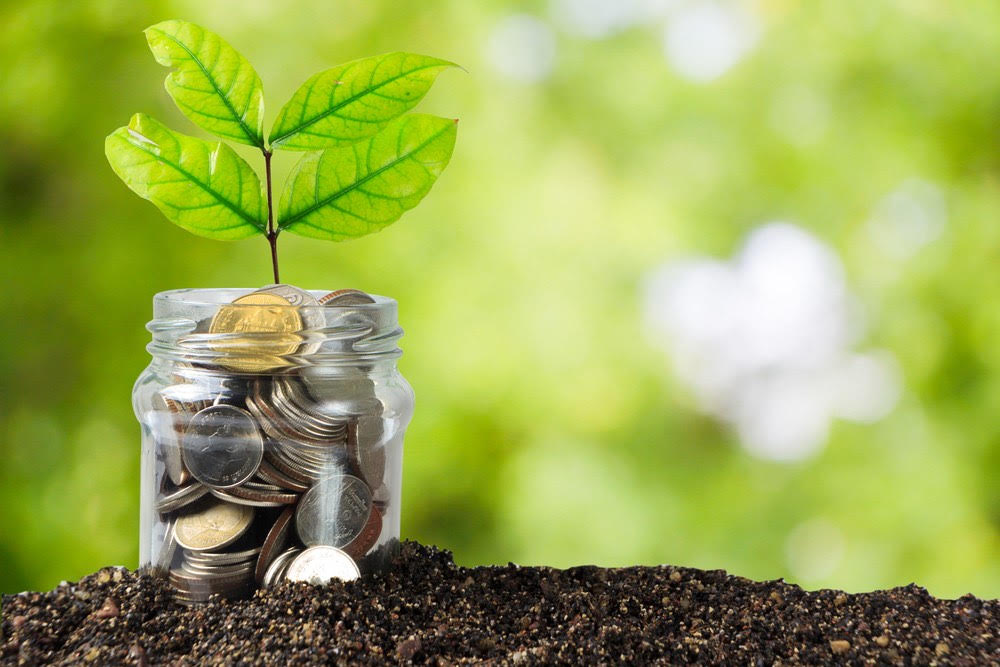
Benjamin Franklin said “A dollar saved is a dollar earned.” Many have taken that to mean that you should save your money rather than investing it. But should I save or invest my money?
Saving your money and investing your money always has some inherent risk. You are never guaranteed to make money when you save or invest. That is simply something no one can guarantee, not you, not me, not Warren Buffett.
Saving or investing your money comes largely down to individual circumstances. For some people, the risk of losing their investment is far too great, when compared to saving their money. For others, the risk of losing their investment is tiny compared to how much they could earn from investing their money.
Investing
Investing is the process of taking your money and giving it to companies in exchange for ownership in the company. This is usually done because you believe the price of the shares you bought will go up and/or they pay you a yearly dividend.
Pros
Dividend payments each year, a dividend is basically a yearly payment (sometimes twice annually depending on the company) that a company pays shareholders.
I like to think of it as a company saying “Thank you for owning us! Here’s some money!”
Essentially, it is a payment for doing nothing, but giving the company money, which could’ve been years or even decades ago!
Easily done, investing was once something only the rich and powerful were able to do. Even twenty years ago, you had to physically ring up your brokerage and ask them to buy X amount of shares in X company.
But now, as with everything with money (and life), it’s moving online. Where once, you had to go on your phone to ring the brokerage, now, your phone is the brokerage.
Investment apps have allowed for people, especially younger people, to invest with little upfront capital.
Builds wealth, when you look at the richest people on the Forbes 400, they all have investments of some amount.
Obviously, there are famous ones, like Warren Buffett, Ray Dalio and so on, who have made the majority of their money from investing. But even others, like Jeff Bezos and Bill Gates have started investing in the past few years as well!
There is an old adage “The wealthy invest, the poor do not.” And this, is the origins of that adage!
Saves you on taxes, politicians love the economy and love money- even if they aren’t corrupt. Politicians always focus on economic growth, which is to say, that they love it when regular citizens invest in their local or national economy.
Due to this, they are often willing to compromise. They are often willing to let you deduct whatever you invest, from your taxes! This means that not only can you build more wealth, and have a secondary income source, but you can also pay less of that money in the first place!
This cancels out the question of whether you should save or invest, as you are doing both at the same time!
Cons
You don’t make anything until you sell, whist the price of your stocks may go up, you personally do not get anything. Yes, it may lead to higher dividend payouts, more frequent payout etc.
But you do not make anything on the principle of your investment until you sell it. For instance, you could have bought 100 shares of Company X for $100, but now the stock price is $150. You can’t get the extra $50 difference until you sell the shares entirely!
Price fluctuate daily and dramatically, unlike something like a savings account, the value of stocks changes from day to day, and even minute to minute. Whilst you read that sentence, it’s likely that a stock, somewhere in the world, just went up or down in price.
When questioning yourself as to whether you should save or invest, you should bear in mind that whilst stocks have the potential to grow exponentially in value, you should also keep in mind that their price varies. Literally all the time.
This means that if you need to get a certain amount of money out of your portfolio quickly, your investment might not be worth exactly what you thought it was.
Stock market crashes, the stock market is a vulnerable place. It is rather like an emotional teenager (or just an entrepreneur!). Sometimes, it is feeling happy and over the moon. But other times, it is sad and depressed.
It is at the latter, where your investment can often be half or even a quarter of its original value! When the stock market crashes, it often causes a recession in that country, or even the world as is the case for the most recent crashes!
When questioning whether you should save or invest, you need to consider whether you can afford to have your money slashed in half. Or will you need it in order to conform to your budget? Or just to feed yourself?
Nothing is guaranteed, this is often the biggest reason people turn away from investing and towards saving. When you invest, you are never guaranteed to make money, you may even lose money if you don’t properly research your stock!
There are a number of reasons why you may not make a return, such as:
- Your stock goes out of business
- Dividends are cut
- Your stock suffers a large price reduction
- Stock splits
- And more!
Saving
Saving is the process of taking your money and giving it to the bank. The bank keeps the money, using it to lend out to other people, and each year gives you a small amount of money as a “Thank you” for allowing them to lend your money out.
Pros
Allows you to build an emergency fund, building an emergency fund is almost as important as becoming financially free. Arguably, they go hand in hand. Having an emergency fund allows you to take more of a risk when it comes to investing, as you know that you have a back up.
If you are saving, you are probably splitting the amount you save. Most of it is going towards your retirement fund, but a small amount (perhaps 10%) is going to your emergency fund.
This is arguably why you should save rather than invest when you are pondering whether to save or invest your money. This could be done with the foresight that after you have saved over a certain amount, you will transition to investing rather than saving.
Your money is insured, if you live in a financially developed nation that has seen recessions come and pass, you’re in luck. Your money is often covered by your government’s financial regulatory body, such as the FCA or FICA.
This means that if your bank goes out of business, you will still get your money back. Whereas, the people who had invested in that bank before its collapse would’ve lost their entire investment, and wouldn’t have gotten that money back!
Not affected by economic crashes, whilst stocks are often halved in value by a stock market crash, your savings are not! Whilst for the first few days of the crash, you may struggle to access your money, as the banks are attempting to sure themselves up financially, your money is still accessible.
When you are considering whether you should save or invest, consider that you may not be able to afford your money being halved (which is nothing to be ashamed of).
Easily opened, as with investing in the 21st century, opening a savings account is easy too! You can often open savings accounts online due to the fact that you can simply upload the pictures of the documents to the bank’s secure server!
And voila! You have now applied for a savings account. You will likely have to wait until they approve your application, but once they have done that, you’ll be able to start funding your savings account.
You’ll also probably be asked to fund the account with a minimum payment, but this is often tiny when compared to funding a stock brokerage account!
Cons
Limits your earning potential, your money grows at a small amount per year or per month. Sometimes, this is less than half a percent, which is not even remotely near inflation!
This means, that as the price of stuff gets more expensive, the individual buying power of each note is actually less. This means that you have to continue to save, and save more and more each year, which isn’t entirely great seeing as how that likely won’t make you financially free!
This is one of the major things to keep in mind when you are asking yourself whether you should save or invest. You never know what your financial situation will be in ten, twenty, thirty, or even forty years will be!
Fees, some banks and building societies charge you a fee for having a savings account with them. The fees could also be because the bank want to be payed in order to maintain the account.
You should probably try to avoid these by looking at the free options, this way you get the best of both worlds. The account and nothing to pay!
This is again, something that you should keep in mind when deciding whether to save or invest. This is due to the fact that many brokerages are now offering zero percent commissions!
Insurance has its limits, remember earlier when I said about how there was insurance if your bank went under? Sadly, there is a limit to how much the government is willing to pay out, based on what it considers to be ‘reasonable’.
This changes from country to country and year to year, in order to keep up with inflation.
Whilst for some people, the limit isn’t much of a limit, more of an aspiration, for others, it is a serious issue. Especially once you start to get within sight of that limit!
Temptation to overspend, have you ever heard the idiom “Burning a hole in your pocket”?
Perhaps not, but if you have, you’ll know that it links in perfectly with this. It essentially means that you have money sat in a bank account that you can access quickly (and easily).
And because it’s there, you want to spend it. This is always a possibility when you are saving so much money in so many bank accounts. You’ll simply want to spend it all!
Should you save or invest?
Whether you should save or invest is one of the most divisive issues in the realm of personal finance.
There are hundreds, if not thousands of people who will say that you need to save, and save only. There are also hundreds, if not thousands that will tell you investing is the only thing you should be spending your money on each month.
But in all, whether you should save or invest is up to you. Whether you should save or invest is based on your personal circumstances. If you can’t afford to have your investments slashed in half for a few months, don’t invest. Likewise with saving.
Personally, if you were to ask me in the streets “Thibault, save or invest?” I would always answer “Invest!” but then again, I have been an investor for over 15 years.
However, I would also point out, especially to those who want to argue either way, whether you save or invest doesn’t matter. It’s not about how you save or invest, but where you do it.
If you choose to save or invest in the local economy, great! Likewise, if you choose to save or invest in the national or international economy, great! But, if you choose to save or invest in something that’s not worth your time or money, not so great!
Save or invest? Why will you save or invest? Tell me in the comments!

